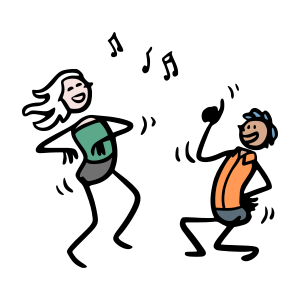Grammar Point:
The term 一边 yìbiān…一边 yìbiān… is used to express the idea of doing one thing while doing another thing simultaneously, with both actions being intentional. It emphasizes that the two actions are happening at the same time and are equally important. If you want to express that something happened while another thing was happening, you should use the A2 grammar structure 的时候 deshíhou.
Structure
S + 一边 yìbiān + VO + 一边 yìbiān + VO yìbiān
我常常一邊寫中文一邊聽音樂我常常一边写中文一边听音乐
I often listen to music while writing Chinese.
爸爸不喜歡我一邊吃飯一邊說話爸爸不喜欢我一边吃饭一边说话
Dad doesn’t like it when I talk while eating.
你可以一邊看Insta一邊上班嗎?你可以一边看Insta一边上班吗?
Can you scroll Insta while working?
他一邊要工作,一邊還要學中文,真的太累了!他一边要工作,一边还要学中文,真的太累了!
He has to work and learn Chinese at the same time. It’s really too tiring!
你怎麼可以一邊說愛我,一邊又和前女友約會!你怎么可以一边说爱我,一边又和前女友约会!
How can you say you love me and date your ex-girlfriend at the same time!
S + 边 biān + VO + 边 biān + VO
There is not a big difference between this structure and the last one. However, this structure is slightly more formal than the one with 一 yī.
哥哥總是邊洗澡邊唱歌哥哥总是边洗澡边唱歌
My brother always sings while taking a bath.
你不可以邊吃飯邊寫作業你不可以边吃饭边写作业
You can’t write homework while eating.
邊開車邊打電話是一件危險的事边开车边打电话是一件危险的事
Driving while talking on the phone is a dangerous thing.
你邊吃雞排邊喝珍珠奶茶,太可惡了!你边吃鸡排边喝珍珠奶茶,太可恶了!
You eat fried chicken while drinking bubble tea. Dame it! (I envy you.)
FYI
“可恶 kěwù” is a Chinese slang phrase that can be translated to “hateful/annoying!” or “Dammit!” It’s a way of expressing extreme frustration or anger towards a situation, behavior, or person. For example, if someone cuts in line or does something selfish, you might say “太可恶了!” to show your disapproval and frustration.
The phrase can also be used playfully or exaggeratedly, such as when you’re joking around with friends or exaggerating a situation for effect. For instance, if your friend posts an Instagram photo about the many luxury gifts she received for her birthday, you could comment “可恶!好羡慕!” (kěwù! Hǎo xiànmù!) to express your playful envy.
S + 边 biān + V + 边 biān + V
This one is not about formal or informal. Rather, we only use it when the object is clearly understood by both the listener and the speaker.
我們邊說邊笑我们边说边笑
We laughed as we talked.
他們邊走邊吃他们边走边吃
They eat as they walk.
Practice
TouchHover over the space to see the answers.

➡️
他們一邊跳舞一邊唱歌他们一边跳舞一边唱歌

➡️
她們邊說邊做她们边说边做

➡️
他一邊洗澡一邊喝紅酒他一边洗澡一边喝红酒


